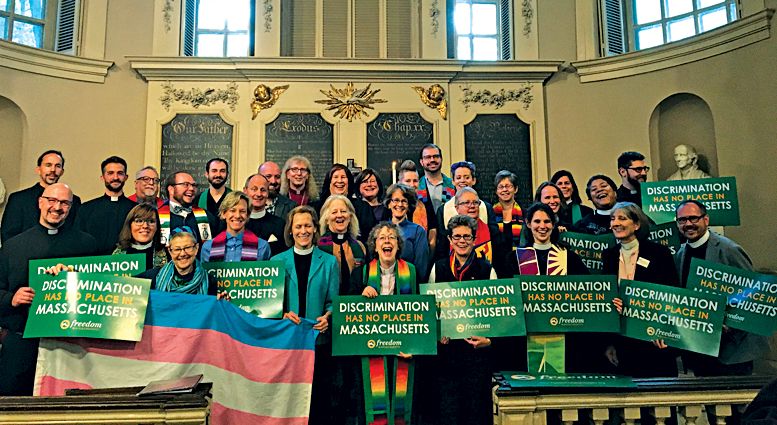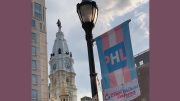Four churches and their anti-trans initiatives threaten transgender equality in the Bay State
By: Mike Givens/TRT Assistant Editor—
As a child, Liv Wyatt remembers controversial televangelist Pat Robertson preaching at her church in Portsmouth, Va. It was the ’60s and Robertson was a skilled preacher, one who would go on to amass a fortune as a right-wing commentator, international businessman, and religious demagogue.
“He was a charmer,” said the 61-year-old Conway, Mass. resident. “Sadly, what he [was] selling more than anything was his own greed.”
Wyatt grew up in Portsmouth during the ’50s and ’60s and Robertson’s religious fervor was endemic to the predominantly white community she grew up in. Wyatt said she observed the racism, homophobia, and “othering” commonplace within southern religious enclaves.
“When I was growing up, there were no gay people and the idea one could be transgender was unimaginable,” she said. “Sure, there were gay people and everybody knew it, but they were buried so deeply in the closet that as far as society was concerned, they didn’t exist.
“I knew I was different from the other boys. When they all got G.I. Joe’s, I would have been far happier off with the girls playing with Barbies®, but that just wasn’t possible so I played along. I will say I was probably the only boy in the neighborhood that never pestered my parents to buy me a G.I. Joe®. I occasionally liked to dress [up] and even played with makeup a little, but couldn’t imagine I might not be a boy. I just thought I was a bit weird.”
The distinct feeling of dysphoria was so incredibly foreign, so threatening, that she buried it away.
“If I had told someone that I sometimes felt I was a girl I would have been rushed to the psychiatrist who would have immediately labeled me as delusional and recommended I be sent to an institution. We joke about it now, but it happened. I wasn’t stupid, so I drank the Kool-Aid and bought into the assumption that I was a boy, just a strange one.”
In her early 20s, Wyatt experienced a revelation, though, one that would change the course of her life: She saw a transgender woman for the first time.
“To put it mildly, I was blown away. Literally the first thought that passed into my head was, ‘Oh, you can do that?’ followed quickly by ‘I wish I was you.’ That was the moment I knew I was in trouble.”
Wyatt says she spent the next 30 years trying to reconcile that one brief experience with what she’d been taught growing up.
“Dysphoria is a strange thing,” she said. “You do your best to hide from it.
“For the longest time I did a pretty good job of it, but it was always there, sort of gnawing away at me. It would rear its ugly head occasionally and I would do my best to stuff it back in the box. Sometimes I could, but it always came back.”
In her 50s, a shift happened. Over the course of eight years, Wyatt eventually grew to accept herself and began the process of embracing her true identity.
On October 1, a new law providing explicit legal protections for transgender people in public spaces like shopping malls, restaurants, and hospitals, went into effect. The signing of the bill by Republican Governor Charlie Baker in July was a much-welcomed victory for Wyatt and other members of the trans community across the Bay State.
Recently, however, a civil lawsuit has been filed against two state agencies claiming the law is a violation of First Amendment rights. Also, a statewide coalition has successfully collected enough signatures to put the law on the 2018 ballot, a move that could overturn the legislation and strike a significant blow against trans rights in Massachusetts.
The Lawsuit
Just 10 days after the public accommodations law went into effect, Horizon Christian Fellowship in Fitchburg, Abundant Life Church in Swansea, House of Destiny Ministries in Southbridge, and Faith Christian Fellowship in Haverhill filed a civil lawsuit in U.S. District Court against the Massachusetts Commission Against Discrimination (MCAD) and the Massachusetts Attorney General’s Office (AGO). The allegations claimed that enforcement of the law by the two agencies is a violation of their First Amendment right to freedom of religion.
“This is a civil rights action to stop the Commissioners of the Massachusetts Commission Against Discrimination (“MCAD”) and the Massachusetts Attorney General from punishing four Massachusetts churches and their pastors because they wish to communicate their religious beliefs regarding human sexuality and use their buildings in a manner consistent with their religious beliefs,” reads the 38-page complaint, “Horizon Christian Fellowship v. Williamson.”
“Religious liberty is the cornerstone of the First Amendment. Remove it, and all other civil liberties collapse,” said Christina Holcombe, legal counsel for Alliance Defending Freedom, an Arizona-based organization that advocates for religious freedom and funds litigation for such cases internationally. “Make no mistake, a government that can threaten a church for what it believes is a danger to the freedom of everyone it governs.”
The four complainants contend in their lawsuit that, “The Churches believe and teach that when God created humankind, He made each person as either male or female, and that the two complementary halves of humanity—biological males and biological females—together reflect the image and nature of God.”
The lawsuit, filed on their behalf by the ADF, blames both the AGO and MCAD for not creating a religious exemption to the law, which in effect makes church property areas of public accommodation and subject to the law’s mandate against discrimination based on gender identity.
“The language of the Act is broad enough to include within that prohibition written sermons, theological expositions, educational presentations, newsletters or church worship bulletin text, or other statements from the Churches, Pastors, and other religious leaders,” another section of the lawsuit reads.
The churches contend that they are welcoming of transgender people and “ … want to be a blessing to them, and want to minister to them.”
“This case is also about stopping MCAD and the Attorney General from forcing the churches to use their facilities in a way that violates their religious beliefs about human sexuality,” the lawsuit claims, noting in a few instances concerns around restroom access and usage.
“Requiring the Churches to allow individuals to use the facilities reserved for the opposite biological sex contradicts the churches’ message about God’s intention and purpose for human sexuality,” reads another section of the lawsuit.
“When they say that the AG’s ruling ‘contradicts the churches’ message about God’s intention and purpose for human sexuality’ and that it forces them to ‘speak a message that they do not want to speak; namely that sex is fluid, that it is based on subjective experience, and that God approves of biological males using restrooms and shower with females and vice versa,’ it shows a complete lack of understanding of what it means to be transgender,” said Wyatt, who said that the authors of the lawsuit need to “re-read their Bibles.”
“As someone who was raised as a Christian … I think I know my Bible well enough to know that what Jesus taught was at its core love, acceptance, respect, and tolerance of others,” she continued. “By the way, I’ve read the Bible front to back and don’t seem to recall him ever saying anything about queer people.”
But the leaders of the four churches have a different interpretation of the Bible and its edicts. The Rainbow Times attempted to interview representatives from each of the four churches, but was supplied with the following statements from Pastors Marlene Yeo of Faith Christian Fellowship, David Aucoin of Abundant Life Church, Esteban Carrasco of House of Destiny Church, and George Small of Horizon Christian Fellowship:
“We welcome everyone to our churches, no matter who you are. Our faith teaches us to treat everyone with love, respect and dignity. All we ask is to have the freedom to teach our beliefs and operate our houses of worship according to our faith, without being threatened by the government.”
In response to the lawsuit, Jillian Fennimore, press secretary for the AGO, released the following statement:
“We are pleased that we finally have a law in place that protects transgender people from discrimination in public places. This law is about civil rights and is critical for people who were without full protection and equality under the law for too long.”
When asked by The Rainbow Times for a comment on the lawsuit, a representative for MCAD said that they do not comment on pending litigation.
Jaime Matheny, 42, of Arlington, said she feels that the lawsuit is just another attack on the trans community and an attempt to erase trans identities.
“From lawsuits to violence, those who hate us and fear us are scrambling to find ways to ensure their place in society,” she said. “They want us to cease existing. They want us to vanish as if we were a bad dream.”
Freedom Massachusetts, a coalition of advocacy organizations across the Commonwealth, released a response to the lawsuit on their website calling the effort a “ … last-ditch scare tactic … ” against transgender people.
“For decades in Massachusetts, churches have complied with nondiscrimination laws—and updating the law to include transgender people does nothing to take away protections from congregations, clergy, and people of faith to practice what they believe,” a portion of the statement reads. “Hundreds of faith leaders and communities spoke out in strong support of the transgender protections law this year, making clear that equal treatment does not infringe on religious freedom.”
According to the coalition, more than 300 members of the clergy and more than 50 congregations have come out in support of the public accommodations law.
Brianna Harris, 55, of Jacksonville, Vt., said she sees the clergy members behind the lawsuit as hypocritical.
“Since religious freedom is already protected and trans anti-discrimination is now law in Massachusetts, I find it interesting that now it would seem that churches are the ones ‘asking for special rights and privileges,’” she said.
As a Vermont resident, Harris said she’s glad that Massachusetts has followed the trend of several other states in providing explicit legal protections for transgender people, but the lawsuit has discouraged her.
“It is a relief that Massachusetts has finally done the right thing by extending anti-discrimination protections to trans people but if the people of Massachusetts decide that I am not worth protecting, I may be forced to keep my money in my own state of Vermont where I am protected,” she said.
Anti-trans advocacy around the bill has been relatively successful on a legislative front also. A recent effort to pose a ballot question potentially overturning the law has gained enough signatures to bring it before voters in the state’s next major election in 2018.
The Ballot Initiative
On the afternoon of October 11, the same day the civil lawsuit was filed in U.S. District court against MCAD and the AGO, Keep Massachusetts Safe, a campaign devoted to overturning the public accommodations bill, announced that it had reached a milestone.
“ … the Keep MA Safe ballot question committee was informed that the final count after review by the Secretary of State is still over 34,000, which means Keep MA Safe has met the constitutional requirements to put this dangerous law on the ballot in 2018,” reads an announcement on their website.
Soon after Governor Baker signed the bill into law in July, the Massachusetts Family Institute, (MFI) a conservative advocacy organization and years-long opponent of the legislation, threw its support behind Keep Massachusetts Safe and mobilized its members to collect enough signatures to pose the question of overturning the law during the 2018 election.
The campaign needed to collect 32,375 signatures within 90 days of the law’s signing and turn the signatures in to the Secretary of State’s Office. According to Keep Massachusetts Safe, more than 50,000 signatures were collected.
The Rainbow Times attempted to reach Andrew Beckwith, president of the MFI, for an interview, but an e-mail and a follow-up phone call were not returned. According to the ADF’s website, Beckwith is the local counsel for the four churches who’ve filed a lawsuit against the AGO and MCAD.
Governor Baker, who’d previously been a vehement opponent of the public accommodations law, recently said in an interview with WGBH that he would vote against overturning the law.
“I signed the transgender rights legislation when it came to my desk because I don’t think anybody should be discriminated against, and that’s my position,” Baker said in the interview. “I’ve said many times that if people can collect the signatures to put a question on the ballot, it should go to voters.”
The Governor then went on to say that, as a citizen of the Commonwealth, he’d vote against the ballot question.
Reaction and Mobilization
On October 13, just two days after the lawsuit and ballot initiative announcements made headlines, members of the trans community and their allies held a rally at King’s Chapel in Boston.
“This is essentially a fringe group of people trying to speak for an entire faith community,” said 24-year-old Kaden Mohamed, who spoke at the rally, of the lawsuit. “I do not believe that religion should be about putting other people down and discriminating against different identity groups.
“It should be about community, love, caring, giving, and support—all things that the transgender community needs to feel like we are truly part of this state.”
“The event left me personally, deeply moved by the compassion and support for trans rights, from so many different voices,” said Mason Dunn, executive director of the Massachusetts Transgender Political Coalition, which co-chairs Freedom Massachusetts.
“I don’t think I’ll ever forget the end of the rally, when the entire crowd sung a trans-inspired rendition of ‘This Little Light of Mine.’” Hearing so many voices, from different perspectives, backgrounds, faiths, and experiences sharing that moment was inspirational, to say the least.”
Dunn said that Freedom Massachusetts and its allies will continue its work to defeat the anti-trans efforts.
“Just as with the legislative advocacy, we know that telling our stories is the best way to change hearts and minds,” he said. “MTPC will be working in our community at the grassroots level, and empower community members to tell their stories.
“We will continue to work with our coalition partners to educate and advocate for trans rights, from the State House to the voting booth.”
Recently, Wyatt was having a conversation with someone about restroom access and transgender people. She made the often-used argument that many trans rights advocates call upon when discussing sex-segregated facilities.
“When I pointed out to him that this is a non-issue and that there had been no reported issues of a trans person doing something nefarious in a public restroom his response was, ‘Not yet.’
“His implication was clear; in spite of overwhelming evidence to the contrary, trans people cannot be trusted.”
For those who use religious beliefs as justification for transphobic sentiment, Wyatt is quite clear in her own beliefs:
“On occasion I have been told by someone that their religion tells them to ‘Love the sinner but hate the sin’ when dealing with LGBTQ people,” she said. “Being a trans person is who I am, not something I do.
“The implication that I am doing something that is a sin that you hate is by default saying [who] I am is a sin and you hate me.”
Wyatt then discussed another trope often used by religious conservatives.
“Then there’s that old line that ‘God doesn’t make mistakes.’ I agree with that one 100%. He doesn’t and I am not a ‘mistake.’ I am the person I was born to be. It may not be who you are or something you understand, but please don’t call me a mistake. If you truly believe God doesn’t make mistakes then don’t call me one, because I’m not.”
Gloucester, Va. is about an hour north of where Wyatt grew up in the ’50s and ’60s and in 2017 will be a hotbed of media attention around trans rights. On October 28, the U.S. Supreme Court announced that it will hear the case of 17-year-old Gavin Grimm, a transgender high school student fighting for the right to use the boys’ bathroom. Grimm, whose birth certificate identifies him as female, informed administrators at Gloucester High School in 2014 that he was male and had legally changed his name. The student and his mother filed a discrimination lawsuit against the county for not allowing him to use the boys’ restroom and a lower court ruled in their favor. The county is now appealing the verdict with the Supreme Court and arguments will be heard next year.
Wyatt sees Grimm’s struggle as one of a larger collective fight across the country.
“A friend of mine once said something that’s perhaps beneficial to remember at times like this: ‘Sometimes the most radical thing we can do is simply exist,’” she said.
“Being openly out, being competent in my job, being respectful and doing my level best to be a good person is probably the most important thing I can do to forward trans acceptance. I learned long ago that you can’t win every battle but I’m in it for the long haul.”
Jaime Matheny said the anti-trans attacks will not destroy the spirit of the trans community, but will only intensify it.
“We are here. We have been here. We are your neighbors, your co-workers. We go to your churches; we go to your schools and gyms. We will endure and we will persevere. We will win this fight. It isn’t a question of safety, our existence isn’t a debate. Make no mistake we are fighting for our survival. I have hope that through work and education we will win this fight.”







